Sharply plotted, exciting and serialized(!) – exactly what you don’t expect from a throwback ’80s syndicated adventure series.
By Jason Hink
Mill Creek Entertainment, along with Sonar Entertainment, has released Crossbow: The Complete Series on DVD and digital streaming, the 1987-1990 syndicated period adventure portraying legendary sharpshooter William Tell and his fight against the tyrannical rule of Hermann Gessler, corrupt governor of Austria who forges a lifelong enemy in Tell after burning his village to the ground in an attempt to annex more land for his growing empire. Can the peaceful, resourceful Tell live up to the legend of his name to lead a great rebellion against evil Gessler and his dreaded army of Black Knights? It’s an exciting, well-paced adventure serial for this first season, which is what I’m covering in this review (because here at Drunk TV, we looove TV – we don’t just watch a handful of episodes to formulate an opinion; we watch them all.)
Click to order Crossbow: The Complete Series from Amazon.
Your purchase helps us pay the bills at this website!
Airing in Europe under the various titles William Tell or The Legend of William Tell, Crossbow was produced by Steven North and Richard Schlesinger for Robert Halmi Inc., a co-production with French television network FR3, and filmed entirely on location in France (in 1986, I’m guessing, as that date is tagged onto the end credits). The story, set in the 14th century, opens with a nicely staged reenactment of folk hero Tell’s beginnings, a version that features a captured William Tell (Will Lyman, Hull High, Threat Matrix) being forced to fire an arrow via crossbow through an apple placed upon his son Matthew’s (David Barry Gray, 21 Jump Street, TV’s The Client) head for the Emperor’s entertainment. A series of escapes, captures, and chases populate this first-season re-telling of the Swiss uprising with Tell wandering the countryside in search of son Matthew and his wife, Katrina (Anne Lonnberg, Moonraker, The Unbearable Lightness of Being), all thanks to the destruction wrought by empire-building Gessler (Jeremy Clyde, The Mixer, The Alan Clark Diaries).
I wish I’d seen this show as an 11-year-old when it premiered in the fall of 1987, where it aired in the US on The Family Channel, because I would’ve eaten up every second of it. Unfortunately, it arrived just a few years too early. See, in ’87 The Family Channel hadn’t yet re-branded itself with that memorable moniker; beginning life in 1977 as the CBN Satellite Service, the religious-based Christian Broadcasting Network was still calling itself that when it ventured into mixing secular shows with its Christian programming, which consisted mostly of recorded sermons and Pat Robertson’s 700 Club (Robertson founded the network as an extension of his televangelism).
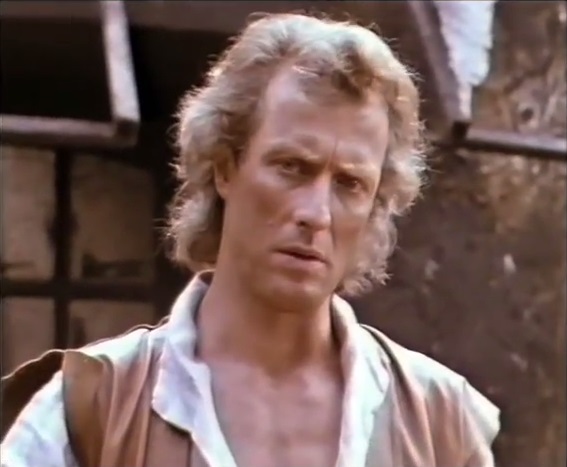 I vaguely remember back then pulling out the Valley Viewer, our local daily’s weekly insert for television listings, and skipping right over the grid line displaying CBN programming. We weren’t a religious, church-going family, so it wasn’t something I was interested in, and I imagine my parents saw Crossbow on the schedule and assumed it was a Christian version of Crossfire. It wasn’t until 1990 and the name change to The Family Channel that I noticed the network. Following Timothy Burton’s Batman in 1989 (a revelation for this youngster!), The Family Channel was my first exposure to reruns of the 1960s Batman television show (Bam! Pow!), which I imagine experienced high revival ratings thanks to the Bat-mania sweeping the country at the time. Riding that momentum, The Family Channel pulled me in deeper with a fun, exciting mix of original series for barely-teens like myself such as Rin Tin Tin: K9 Cop, Bordertown, The Adventures of the Black Stallion, and my personal favorite, a new rendition of Zorro starring Duncan Regehr (yes, my VCR got a workout).
I vaguely remember back then pulling out the Valley Viewer, our local daily’s weekly insert for television listings, and skipping right over the grid line displaying CBN programming. We weren’t a religious, church-going family, so it wasn’t something I was interested in, and I imagine my parents saw Crossbow on the schedule and assumed it was a Christian version of Crossfire. It wasn’t until 1990 and the name change to The Family Channel that I noticed the network. Following Timothy Burton’s Batman in 1989 (a revelation for this youngster!), The Family Channel was my first exposure to reruns of the 1960s Batman television show (Bam! Pow!), which I imagine experienced high revival ratings thanks to the Bat-mania sweeping the country at the time. Riding that momentum, The Family Channel pulled me in deeper with a fun, exciting mix of original series for barely-teens like myself such as Rin Tin Tin: K9 Cop, Bordertown, The Adventures of the Black Stallion, and my personal favorite, a new rendition of Zorro starring Duncan Regehr (yes, my VCR got a workout).
Simply put, Crossbow‘s timing sucked; it would have fit perfectly with what the network was doing in 1990 and would’ve ranked right up there with Zorro as must-see viewing for me. So you might ask, why didn’t I catch some of Crossbow‘s third and final season on The Family Channel during 1989-1990? The simple answer is…because it didn’t air. In fact, it seems the third season has never been seen in the United States and, judging from fan sites and other internet wormholes, only foreign, French-language home video editions have ever existed until now. For whatever reason, The Family Channel dropped the show after two seasons, before it was even called The Family Channel.
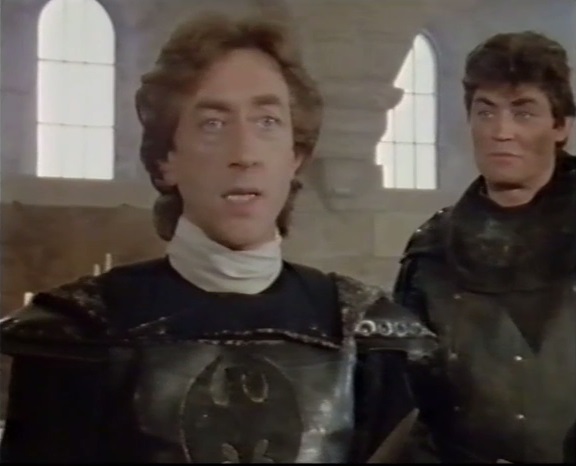 But watching this first season today is still a fun ride, especially if you enjoy 80s and 90s syndicated adventure television (Crossbow could easily be viewed as a prelude to 90s shows like Hercules: The Legendary Journeys and Xena: Warrior Princess – pinnacles of the genre) and are able to watch without foolishly comparing it to something modern like Game of Thones. You’ll enjoy watching Tell, played by Will Lyman as a strong, even-tempered but brooding man who would rather avoid a battle than suffer major bloodshed, despite his prowess as the best crossbow marksman in the world. But you can’t enjoy a good hero if he doesn’t have a great villain to go up against, and Jeremy Clyde as the ruthless, cocky, maniacal Hermann Gessler fits the bill. He’s the classic narcissistic 80s villain, and Clyde plays Gessler to the hilt as a man who loves power, riches and women (he wants to marry the Emperor’s daughter, Princess Irena…and it’s easy to see why – she’s played by the lovely Valérie Steffen). If you dress Clyde-as-Gessler in 1987 threads, give him some cocaine and a couple thugs, he’d just as easily be a memorable Miami Vice villain.
But watching this first season today is still a fun ride, especially if you enjoy 80s and 90s syndicated adventure television (Crossbow could easily be viewed as a prelude to 90s shows like Hercules: The Legendary Journeys and Xena: Warrior Princess – pinnacles of the genre) and are able to watch without foolishly comparing it to something modern like Game of Thones. You’ll enjoy watching Tell, played by Will Lyman as a strong, even-tempered but brooding man who would rather avoid a battle than suffer major bloodshed, despite his prowess as the best crossbow marksman in the world. But you can’t enjoy a good hero if he doesn’t have a great villain to go up against, and Jeremy Clyde as the ruthless, cocky, maniacal Hermann Gessler fits the bill. He’s the classic narcissistic 80s villain, and Clyde plays Gessler to the hilt as a man who loves power, riches and women (he wants to marry the Emperor’s daughter, Princess Irena…and it’s easy to see why – she’s played by the lovely Valérie Steffen). If you dress Clyde-as-Gessler in 1987 threads, give him some cocaine and a couple thugs, he’d just as easily be a memorable Miami Vice villain.
 The overall arc of Crossbow‘s first season focuses on William’s desperate quest to find and rescue his wife and son. I was quite surprised after just a few episodes to learn the producers were giving us a small-screen adventure that’s serialized, and for my money, serialized better than most 80s TV of its ilk. The story builds up its momentum throughout the 24 episodes, adding characters who fit surprisingly well into the narrative, and who pop up now and again throughout, culminating in a fabulous final third of the season, where the Emperor’s kooky family, complete with a drunken prince and the beautiful princess, add fun, soapy drama into the mix.
The overall arc of Crossbow‘s first season focuses on William’s desperate quest to find and rescue his wife and son. I was quite surprised after just a few episodes to learn the producers were giving us a small-screen adventure that’s serialized, and for my money, serialized better than most 80s TV of its ilk. The story builds up its momentum throughout the 24 episodes, adding characters who fit surprisingly well into the narrative, and who pop up now and again throughout, culminating in a fabulous final third of the season, where the Emperor’s kooky family, complete with a drunken prince and the beautiful princess, add fun, soapy drama into the mix.
 Perhaps the most “special” of the recurring guest stars is Conrad Phillips, who plays Stefan, William’s aging mentor. When he arrives with his young, tough-as-nails warrior daughter (Dana Barron, National Lampoon’s Vacation) the lighthearted chemistry translates to the screen believably, and it’s always a treat when Stefan makes an appearance. But what makes it even more special for longtime fans of the William Tell legend is that actor Conrad Phillips actually played William Tell in ITC’s original 1958-1959 The Legend of William Tell TV series. It may have been lost on me as a new viewer, but it certainly adds another positive dimension to his character knowing he was the original Tell from nearly three decades earlier.
Perhaps the most “special” of the recurring guest stars is Conrad Phillips, who plays Stefan, William’s aging mentor. When he arrives with his young, tough-as-nails warrior daughter (Dana Barron, National Lampoon’s Vacation) the lighthearted chemistry translates to the screen believably, and it’s always a treat when Stefan makes an appearance. But what makes it even more special for longtime fans of the William Tell legend is that actor Conrad Phillips actually played William Tell in ITC’s original 1958-1959 The Legend of William Tell TV series. It may have been lost on me as a new viewer, but it certainly adds another positive dimension to his character knowing he was the original Tell from nearly three decades earlier.
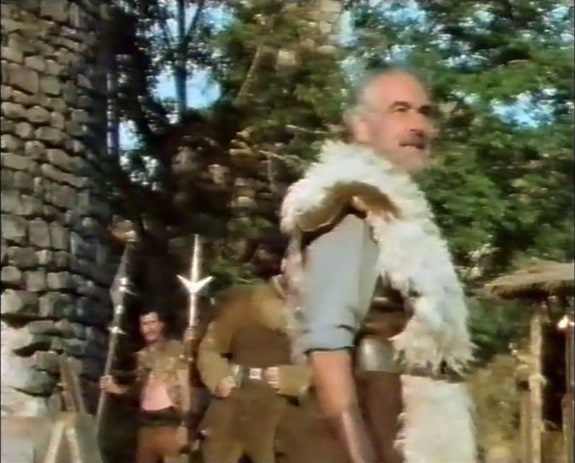

Crossbow‘s first season isn’t without an occasional hiccup, but they only stand out due to the show’s age and the maturity of today’s viewing public. Too often characters are introduced and dropped with little or no explanation, such as William’s friends Roland and Blade (Valentine Pelka and Melinda Mullins), warriors leading the Swiss uprising who are searching for William in hopes that he’ll join them. They pop up every couple episodes before being completely dropped about three-quarters through the season. Due to their stature as “larger” characters in the overall narrative, their late-season absence stood out to me (maybe they’ll return in season 2).
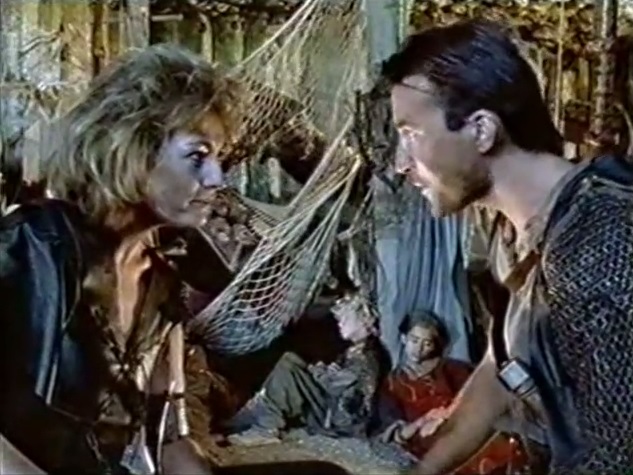
Although rare, occasionally episodes slip into non-serialized storytelling, featuring an adventure-of-the-week format that didn’t move the narrative forward. The most egregious example is the only two-part episode of the season, The Moor, featuring guest star Robert Guillaume (TV’s Benson, Soap) as a “healer” who gets into trouble by swindling folks out of their money with his snake oil salesman ways. Guillaume was likely the biggest “name” to appear on this rather small, obscure series, so for two episodes the story of William Tell takes a backseat as they showcase this special guest. Guillaume is great as always, but the story’s a snooze, and does nothing to move the overall arc forward, and serialization is a major component and draw of Crossbow.

You’ll also occasionally spot the inevitable limitations of small, 80s television budgets, complete with non-CGI and lack of man- (or horse-) power. This is apparent throughout the season if you study Gessler’s army of Black Knights too closely. For a powerful ruler able to take over townships and villages wherever and whenever he chooses, his army sports a small array of troops. I sometimes wondered why the townsfolk didn’t just gang up on them; there are rarely more than a handful of Black Knights in any one battle scene. But admittedly, like a Chuck Norris/Rambo-style “exploding hutter,” bad guys do appear out of the woodwork during large scale fight scenes, so the lack of evil firepower likely boiled down to a lack of actors or horses they were able to put on screen at the same time (this was way before the CGI era, where directors can literally “paint” in a stadium full of spectators when they have no real actors to fill the seats).

The most memorable of these budgetary-constraints-on-screen are the fun ones, such as in the episode The Pass, where Conrad Phillips’ stunt double is legitimately squashed by a falling stunt horse during a battle sequence (that kind of “realism” doesn’t happen on modern TV, kids)… and my favorite faux-pas scene of the season comes at the end of The Dukes of Zharinghen: Three elderly dukes, one with a love of pet birds, are wishing Tell farewell at episode’s end and, as the camera pulls back and the threesome watches William ride off into the sunset, the bird perched on the Duke’s arm takes a sh*t just before the credits roll! Now that’s entertainment!
But these are small nitpicks for what’s a surprisingly solid first season.
 In a way, Crossbow was ahead of its time with the amount of violence, albeit less gory than today’s offerings. But for The Family Channel (especially during its CBN-branded days), this must have pushed the envelope. Part of of this, I suspect, has to do with its origins as a French-English co-production. They just let more sh*t go in European TV than they ever did here in the States, and the location shooting in France lends the show sweep that its budget would’ve never allowed for on a Hollywood backlot.
In a way, Crossbow was ahead of its time with the amount of violence, albeit less gory than today’s offerings. But for The Family Channel (especially during its CBN-branded days), this must have pushed the envelope. Part of of this, I suspect, has to do with its origins as a French-English co-production. They just let more sh*t go in European TV than they ever did here in the States, and the location shooting in France lends the show sweep that its budget would’ve never allowed for on a Hollywood backlot.
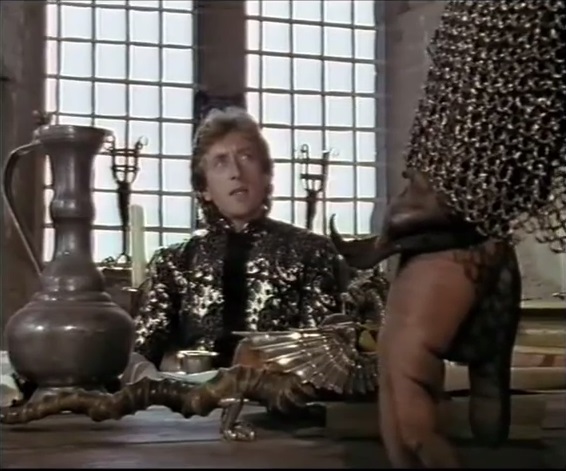

For the first time ever, all three seasons are available to us English-speaking folk here in North America thanks to Mill Creek’s complete series release. It’s not the greatest looking transfer; Crossbow was produced smack-dab in the era of television production where principal photography was shot on film, but editing and mastering were done on videotape. This resulted in many shows from the late 80s to mid-90s having only videotape masters, which can’t be released in a high definition format without going back to the original film, which in many cases doesn’t exist (even if it does for Crossbow, it’s too cost-prohibitive for such a small, obscure TV show anyway). So we’re left with what’s available – the old tape masters originally created for airing on standard definition television. Mill Creek has released Crossbow: The Complete Series on six single-sided DVDs, with each disc sporting 12 episodes that run roughly 24 minutes. Occasional motion artifacts lead me to believe these might have been transferred from a European PAL master. But no matter how you slice it, you know what you’re getting when it comes to a title like this and if you’re a vintage TV fan, you know what to expect.
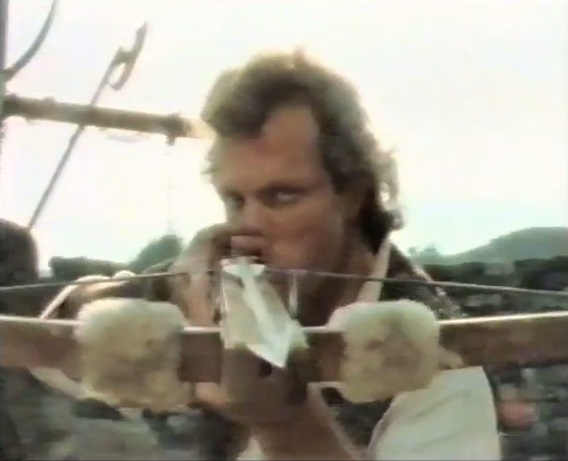 From William’s full-circle realization that he must live up to the “legend” his people have bestowed upon him, to Gessler’s obsession with Tell that inadvertently created this “legend,” if you’re a fan of swashbuckling adventure with a dash of 80s melodrama mixed with plenty of sword fights and deadly quivers, the serialized Crossbow should appeal to true fans of television who are able to look back and enjoy a show that helped serve as a building block for more mainstream and popular shows to come.
From William’s full-circle realization that he must live up to the “legend” his people have bestowed upon him, to Gessler’s obsession with Tell that inadvertently created this “legend,” if you’re a fan of swashbuckling adventure with a dash of 80s melodrama mixed with plenty of sword fights and deadly quivers, the serialized Crossbow should appeal to true fans of television who are able to look back and enjoy a show that helped serve as a building block for more mainstream and popular shows to come.
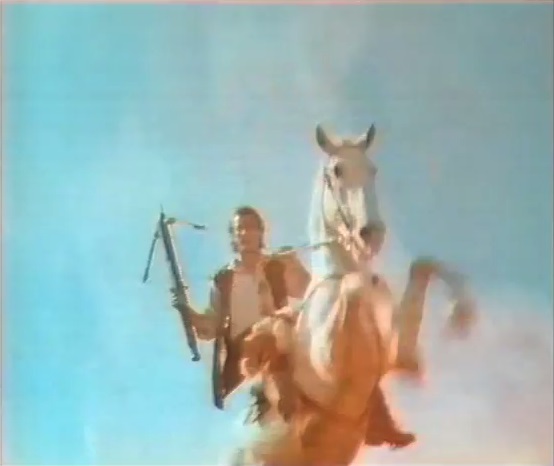 Here are the 24 first-season episodes of Crossbow that aired during the 1987-1988 television season:
Here are the 24 first-season episodes of Crossbow that aired during the 1987-1988 television season:
The Banquet (August 30, 1987)
The literal William Tell legend begins with a nicely conceived premiere episode that leads up to the seminal scene where William (Will Lyman) must shoot an apple off his son’s head with a crossbow in order to spare both of their lives. Evil Austrian Governor Hermann Gessler (Jeremy Clyde) begins his reign of terror, taking control of villages throughout Switzerland, leading young Matthew Tell (David Barry Gray), William’s son, to revolt, setting the stage for the above-mentioned episode-ending archery exhibition. Well staged, well dressed & well acted first episode.
The Prisoner (September 6, 1987)
Location shooting in France heaps a mountain of production value as William is imprisoned by Gessler. A Monte Cristo-style fast-forward shows our hero bearded & awaiting his ultimate fate as Gessler’s goons burn his village down, imprisoning others from his hometown. The William Tell adventure shifts into high gear as William carries out a daring escape plan.
The Little Soldier (September 13, 1987)
I’m digging the serialized nature of Crossbow. William happens upon a 10-year-old boy (Jadrien Steele, spelled ‘Jadrian’ here) in the forest whom he befriends after learning the boy’s father died at the hands of Gessler. William stays with the boy & his mother (Anne Swift), helping repair damage around their home & fighting off another attack by Gessler’s goon squad. Speaking of Gessler, what an evil prick; watch as he kills his own warden out of frustration aimed at escapee Tell!
The Scavengers (September 20, 1987)
While currently leading the Swiss uprising, William’s old friends Blade (Melinda Mullins) & Roland (Valentine Pelka) catch up to him, only to be robbed by a pack of orphaned kids who steal weapons & horses from travelers to resell them to Gessler’s Black Knights. The children live in a cave with their benefactor, a blind blacksmith (Morgan Shepard) who has more than just axes to grind with Gessler. Good performances by the kids in this one.
Reunion (September 27, 1987)
William is captured by a group of resistance fighters but wind up allies after their leader, Stefan (Conrad Phillips), realizes his crew has captured his old friend, William Tell, whose legend is growing across the land. His precocious daughter Eleanor (the original Audrey Griswold herself, Dana Barron) helps plan a heist of Gessler’s tax wagon, which makes twice-a-year visits to the village. Luckily, William is there to help.
Albion (October 4, 1987)
William makes his way back to his hometown of Claremont in search of his wife & son. Finding the village has been burned down, he makes his way to Albion, an old shell of a castle where Claremont’s survivors are attempting to start over. Meanwhile, a large, mean-looking bounty hunter convinces Gessler to hire him to capture William Tell, and he finds his way to the new Claremont castle. Check out the reluctant cross-dressing barmaid (“It’s good for appearances,” his business partner encourages while trying to sell more food & booze).
 Sanctuary (October 11, 1987)
Sanctuary (October 11, 1987)
Nursing a wound following his battle with the bounty hunter’s crew, William stumbles into a religious sanctuary to recuperate. He gets a surprise when he finds wife Katrina (Anne Lonnberg, Moonraker, The Unbearable Lightness of Being) working at the sanctuary under Mother Superior (Elisabeth Kaza) – but is their son, Matthew, dead or alive? Meanwhile, the bounty hunter is still on Tell’s tail. An exciting sword fight ends this outing.
The Dukes of Zharinghen (October 18, 1987)
William is captured outside a castle run by three aging, kooky men known as the Dukes of Zharinghen. After being imprisoned, he must rely on wit, cunning & a newfound (also imprisoned) friend to escape before meeting certain death. This outing strays from the overall serialization, placing Tell in a standalone adventure. Good performances all around, including by guest stars Robert Morley, Andre Raffard & Paul Hanford as the trio of dukes. Keep an eye out at the end of the episode as one of the Duke’s pet birds sh*ts while he’s holding him (the editor must’ve missed it, or perhaps that was the best take of all time).
The Bet (October 25, 1987)
William & his new friend, having escaped capture in the previous episode, make their way to a village where out-of-towners gather for a yearly archery competition, which Governor Gessler’s team has won the past 3 years. Competing behind a mask, William seeks to win big money to help finance his search for missing son Matthew, who he learns is imprisoned at The Citadel, thanks to a face-to-face encounter with Gessler, who suspects the masked archer may be Tell. Tense performances from the leads illuminate the escalating hatred between pro- and antagonist. Honor Blackman guests.
The Stallion (November 1, 1987)
William stumbles upon a watering hole where he spies his old friend Stefan’s daughter, Eleanor (Dana Barron; is she swimming in the nude?). He’s immediately captured by surrounding soldiers, but Eleanor frees him — turns out, she’s been looking for him. Local mercenary Mason is planning a coup which includes offering William up to Gessler. Tell & Stefan (Conrad Phillips) must fight off Mason’s fighters and Gessler’s Black Knights. It’s all set against a subplot involving Stefan gifting a white stallion to William, the horse he rides for the remainder of the season. A nice touch seeing Phillips & Barron in return appearances.
The Imposter (November 8, 1987)
William, Stefan & Eleanor’s chance meeting with man reveals information that someone is posing as William Tell, using the Tell name as a tool to recruit troops & give strength to the Swiss uprising. When the threesome run into old friends Roland & Blade, it becomes clear who the impostor is. (Grammar Nazi note: The spelling ‘impostor’ is more common than ‘imposter,’ as this episode is titled on-screen. However, the DVD menu uses ‘impostor.’ Both are considered “correct” spellings. Thanks, Google.)
The Pass (November 15, 1987)
Things aren’t looking good for our heroes at the season’s halfway point, with Stefan injured, Roland captured by the Emperor’s Imperial Guard, & William captured by the revolutionaries Roland was duping by posing as William. And Blade takes an arrow in the back, leaving young Eleanor as the good guys’ only uninjured, un-captured hope. The good news? Gessler suffers some losses as well. Action-packed episode from beginning to end (and I’m pretty sure Conrad Phillips’ stunt double got legit squashed by a falling stunt horse during the opening chase sequence. Ouch!)
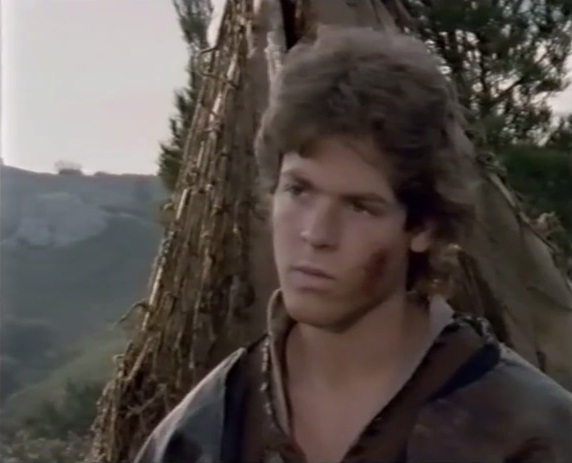
Misalliance (November 22, 1987)
When you’ve watched as much genre TV as I have, you occasionally ask yourself when you’re going to see familiar tropes pop up. Coincidentally, before watching this outing, I wondered when we’d see the inevitable episode where hero (Tell) & villain (Gessler) are captured by a common foe & must work together. Sure as crap, this was that episode. Gaston (a hammy Brian Blessed) chains his prey together with blindfolds, demanding Tell & Gessler battle to the death. Eleanor must recruit Gessler’s lieutenant, Tyroll (Hans Meyer), & the Black Knights, to help her save both men, mirroring the good guy/bad guy teamwork Tell & Gessler must endure. Well-written outing by frequent scripter Edithe Swensen, with solid direction by Allan Goldstein.
The Alchemist (November 28, 1987)
Kinky, creepy wizard Vogel “The Alchemist” played by The Who rocker, Roger Daltrey) has the hots for young Eleanor, having captured her & William after they “trespassed” on his property. Vogel wants Eleanor to be his next wife and Williammust race the clock (literally, the bad guy uses an hourglass) to save her. An Indiana Jones-inspired adventure that takes William through a funhouse of magic, mazes & fantasy, teaming him with a cowardly minstrel, Francois (David Warner), who helps him weave his way back to Eleanor for a final showdown with Vogel. Nice standalone outing written by Harry Kappes, directed by David Kappes (could be related; who knows).
Possessed! (December 6, 1987)
He’s back! William’s mentor, Stefan, survived an arrow to the back, but he’s in a bad place – an asylum where Gessler cages his prisoners, brainwashing them until they go nuts. William goes undercover to infiltrate the compound while Eleanor works her own plan to rescue her father, all to dire results. With the help of a beautiful prisoner named Rosanne, can our heroes rescue Stefan & get out alive?
The Moor: Part 1 (December 13, 1987)
Benson!? Robert Guillaume (Soap, Benson) guest stars as saint snake oil salesman Nolan Ben Sunniman Al Hedrem, a charlatan who rakes in the cash among the folk of the town of St. Claire by “healing,” calming fears, & lodging positive predictions, just like those cable TV 900 numbers you used to call in the middle of the night. William decides to visit him & his kooky psychic wife to find clues about his missing son. But a murder & double-cross lands Guillaume in prison. Had I not seen Guillaume’s name in the opening credits, I still would’ve spotted him in that 14th century garb covering his face – there’s no mistaking the voice of that popular 70s & 80s sitcom actor.
The Moor: Part 2 (December 20, 1987)
The second half of this standalone outing has Nolan Ben Sunniman Al Hedrem (Robert Guillaume) seeking to clear his name & find those responsible for his wife’s death. With William Tell’s help, he’s able to escape imprisonment & dodge a witch hunt…but can he bring his wife back to life? Lots of supernatural hokum with the producers clearly focusing on big-name guest Guillaume, relegating William to supporting character. Guillaume is fantastic in his role, but Crossbow is best when it sticks to snappy adventures focusing on man-of-action Tell.
The Four Horsemen (December 27, 1987)
William makes his way to The Citadel & spots his son, Matthew, now a prisoner of the Emperor. To plot a rescue mission, William visits his old war buddies, who used to call themselves “the four horsemen” before William left the group (they think he left to join the enemy). To get back in their good graces, William must undergo a series of physical & mental tests. Meanwhile, Matthew hangs with the snotty prince while flirting with bitchy, but beautiful, Princess Irena. Harry Carey Jr. guest stars.
 The Citadel (January 3, 1988)
The Citadel (January 3, 1988)
With the help of his fellow “four horsemen,” Tell enters The Citadel with a plan to rescue son Matthew. Meanwhile, Governor Gessler arrives with gifts in tow in hopes of wooing Princess Irena. To accomplish this, he flatters eccentric, high-pitched-voiced, drunken Prince Martin (hilarious Timothy Stark), who agrees to speak to his father, the Emperor (Guy Rolfe), on behalf of Gessler, to disastrous results. In the final showdown, William makes his play, but it doesn’t go as planned as allegiances are tested. Fun, fast-paced outing. The addition of the Emperor & his family adds a new recurring set of characters that are a hoot any time they pop up.
The Princess (January 10, 1988)
With William & his charges captured & the death of son Matthew looming as punishment, Tell stages an escape with the help of Stefan. It doesn’t go as planed (of course) as the good guys wind up trapped with Princess Irena in a fortified position within a locked castle outbuilding. With the princess as a “hostage,” can William negotiate an escape with Gessler? Some great dramatic scenes between Lyman & Clyde as Tell & Gessler, each playing off each other as the sworn enemies they’ve become. The episode feels like a logical ending for the events that led up to it, but hold your horses, kids; there are 4 episodes to go!
Lotus (January 17, 1988)
Over-eager Matthew is looking for a fight, & William has his hands full trying to keep him in check. Elsewhere, a mysterious, mythical woman named Lotus (a nicely measured performance by Chinese actress Ling Tai, Dr. Who, Spatz) offers up a weapon of destruction to William, but it’s Matthew who wants to take her up on the offer. This outing shines a light on the future of William & Matthew: Do they go to war & win back their lost village or lay low, hoping for peace while avoiding conflict? I bet you can guess the answer…
The Physician (January 24, 1988)
The journey continues for William & Matthew as they wander into a mysterious deserted town. After learning the town was abandoned due to the plague, Matthew must track down a nearby kingdom’s physician (Bruce Myers) when William falls ill. Horst (Nick Brimble), now comfortably in charge of Gessler’s Black Knights, continues tracking the Tells.
The Handmaiden (January 31, 1988)
The penultimate episode of this first season is a wild ride, a legitimate mini-chase movie with Gessler’s minions tracking William & Matthew, using every trick up their sleeve to do it, including Princess Irena’s & her handmaiden’s unlikely bond with the Tells. These episodes featuring the Emperor & his royal family stir some engaging soapy drama into the mix, along with an exciting episode-ending chase between the Tells & Black Knights. In the end, it’s apparent Gessler may have put together his best plan yet for capturing William Tell…a plan not even the Emperor will be able to stop.
The Rebirth (February 7, 1988)
A despondent William falls into depression after learning Gessler has killed his wife, leaving angry Matthew to fight on his own. Gessler, meanwhile, has weaseles his way into the Emperor’s throne after the Emperor mysteriously falls ill, allowing Gessler to amp up the Black Knights by adding additional soldiers from the Emeror’s Imperial Guard. An episode-ending reunion between father & son foreshadows what’s to come as William comes full circle. No longer the apprehensive man of peace, the legendary William Tell is at last ready to lead a great rebellion. It’s a satisfying, emotional season finale.
Jason Hink is a writer, editor and content producer. Sign up for his Email Newsletter here. For more of Jason’s reviews, visit here.




I have noticed you don’t monetize your website, don’t waste your traffic, you can earn extra
bucks every month. You can use the best adsense alternative for any type of website (they approve all
websites), for more details simply search in gooogle: boorfe’s tips monetize your website
LikeLike
Thanks for this detailed review.
On the technical side, could you tell us if this DVD edition contains subtitles (English or otherwise) and the French dubbing audio track ?
Thanks from France
LikeLike